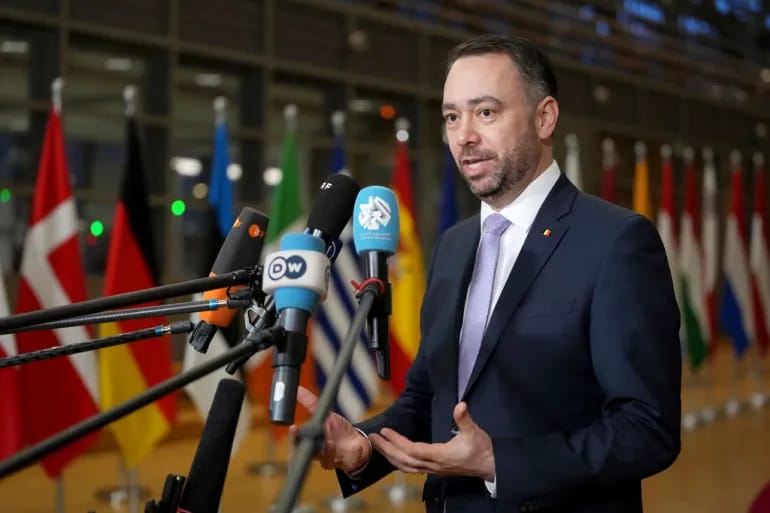- The Situation Room
- Posts
- The Situation Room - September 3rd
The Situation Room - September 3rd
Good morning everyone,
I’m Daniel, and welcome to The Situation Room! We cover the most high impact geopolitical developments every Wednesday!
Today’s topics:
Belgium Moves To Recognize Palestinian State
Afghan Earthquake Kills Over 1,400
Hegseth Taps 600 Military Lawyers To Backfill As Immigration Judges
Belgium Moves To Recognize Palestinian State

Belgium's Foreign Minister Maxime Prevot announces 'firm sanctions will be imposed against the Israeli government' (Virginia Mayo - AP)
By: Atlas
Belgium said it will recognize a Palestinian state at the United Nations General Assembly this month, joining a coordinated push alongside countries including France, the United Kingdom, Canada, and Australia. Foreign Minister Maxime Prévot announced the decision on Sept. 2, framing it as a political commitment to a two-state outcome that will be presented at the UN, with administrative formalization tied to additional steps on the ground.
Sanctions package and scope
Brussels paired the recognition move with sanctions on Israel that Prévot described as “firm.” Measures outlined across official statements and reporting include a ban on imports of goods produced in Israeli settlements in the West Bank; a review of public procurement policies with Israeli companies; limitations on consular assistance to Belgians living in settlements deemed illegal under international law; and entry bans for designated individuals. Belgium also signaled readiness to support European Union initiatives to suspend elements of cooperation with Israel, including research programs and parts of the association agreement, while emphasizing that the steps target government policy rather than the Israeli public.
Belgian authorities specified that two Israeli ministers—Itamar Ben-Gvir and Bezalel Smotrich—along with certain violent settlers and Hamas leaders would be designated persona non grata. Separate explanations from Brussels indicated that military overflight requests from Israel would be restricted while the war continues and that additional listings could be coordinated at the EU level.
Conditions and procedure
Belgian recognition will be announced politically at the UNGA, while the legal “administrative formalization” by royal decree is conditioned on two points: the release of all remaining hostages and the exclusion of Hamas from any governing role in Palestine. The government presented those conditions as a coalition compromise and linked them to the aim of preserving a two-state framework; press accounts summarized the approach as announcing recognition at the UN while delaying formal steps until the conditions are met.
Belgium’s decision is part of the “New York Declaration” track, which lays out a path toward a two-state arrangement and is backed by European and Arab partners. Brussels said it would sign the declaration and called on Arab states to recognize Israel in parallel, positioning its move as a diplomatic signal to sustain a negotiated outcome.
International reactions and parallel developments
Israeli officials criticized European recognition plans, warning they would “reward terror.” Belgium’s measures drew particular attention because they combine recognition with sanctions—focused largely on settlements—and because they arrive as several Western governments weigh similar steps. The Palestinian Ministry of Foreign Affairs welcomed Belgium’s announcement and urged other countries to follow suit, arguing that such actions align with international law and support a two-state solution.
Separate developments around the UN meeting shape the context. The United States said it would deny visas to Palestinian Authority President Mahmoud Abbas and other PLO leaders for the session, a move that prompted criticism from Turkey’s President Recep Tayyip Erdoğan and underscored divisions over diplomatic access in New York. Belgium’s announcement arrived amid continued Israeli operations in Gaza and international scrutiny of humanitarian conditions there.
Implications and what to watch
Belgium’s package marks two parallel tracks: a political act of recognition at the UN alongside sanctions that the government says are designed to increase pressure for compliance with international humanitarian law. The sanctions focus primarily on settlement-linked activity, travel bans for specified figures, and limits related to military overflights, while leaving space for broader EU coordination. On recognition, Brussels has set a conditional sequence—UN political signal now, formalization when hostages are freed and Hamas is out of governance—which reflects domestic coalition management and an attempt to balance diplomatic pressure with stated guardrails.
In the near term, key markers include how Belgium implements the settlement import ban and related procurement reviews, whether additional names are added to persona non grata lists, and how EU institutions respond to Belgian backing for suspended cooperation. On the recognition side, attention will turn to the language Belgium delivers at the UNGA, coordination with countries moving on similar timelines, and any movement on the stated conditions for formalization.
Regionally, the diplomatic picture remains fluid: Israel continues operations in Gaza; casualty counts and humanitarian assessments remain contested; and Western and regional governments are calibrating pressure points, from recognition statements to targeted restrictions. Belgium’s move adds an EU-host nation’s voice—home to both NATO and EU institutions—to that mix, coupling an announced intention to recognize Palestinian statehood with a defined set of sanctions meant to signal legal and policy objections to settlement expansion and conduct of the war.
Bottom line
Belgium will declare at the UN that it recognizes a Palestinian state and, in parallel, is rolling out sanctions centered on settlement-linked trade, consular restrictions tied to settlements, travel bans for named officials and others, and limits on Israeli military overflights—while reserving legal formalization of recognition until hostages are released and Hamas is out of governance. The decision aligns Belgium with a cohort of Western governments signaling support for a two-state path and adds economic and diplomatic pressure points aimed at Israeli government policy, as Brussels pushes its case at the UN and within the EU framework.

Reply